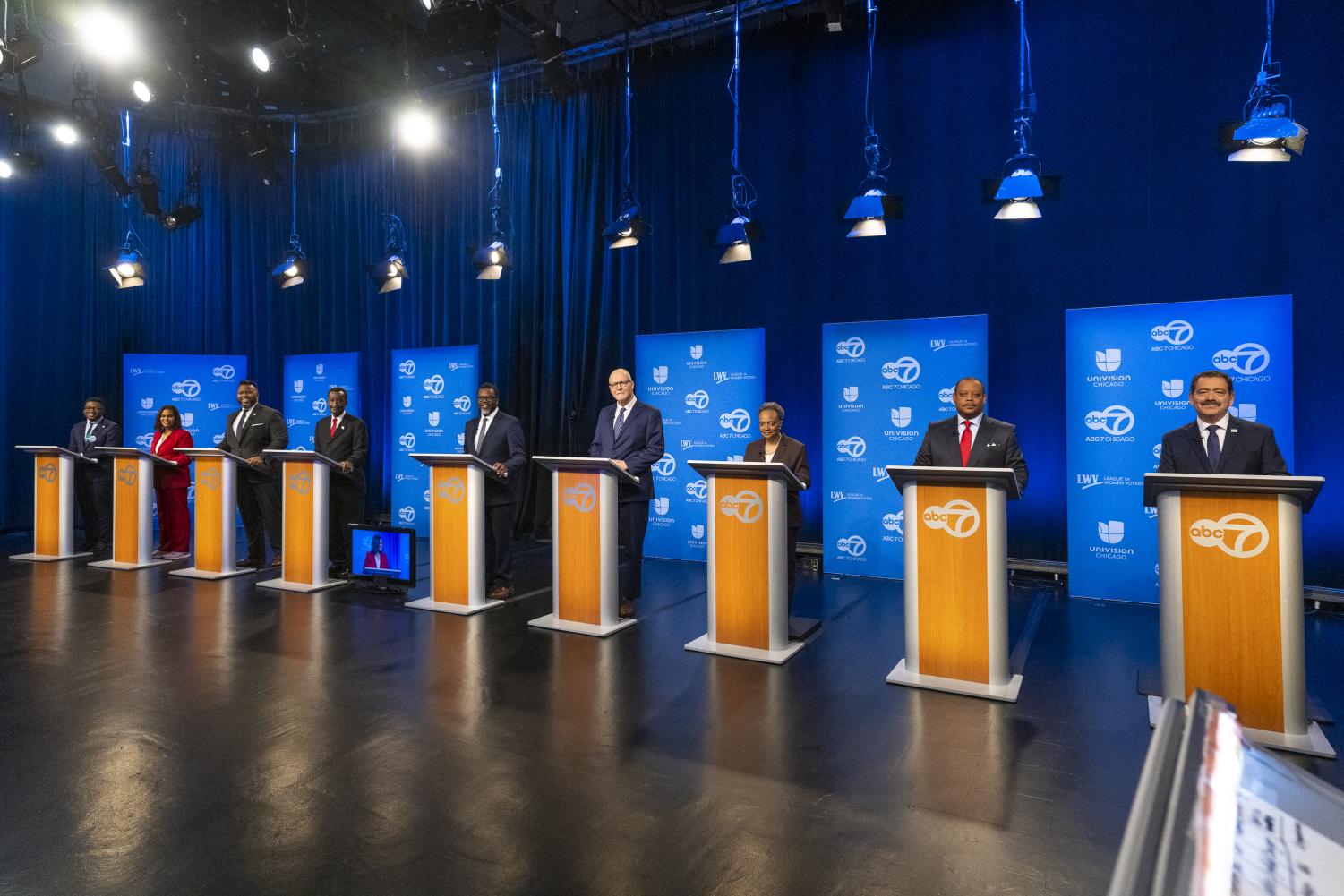2023 Voter Guide for Chicago Mayor
February 24, 2023
Voters will cast ballots for mayor, City Council members and new Police District Council representatives in the Feb. 28 municipal election. This is the first municipal election since the COVID-19 pandemic. The city also has seen spikes in violent crime, and the transit network is struggling. The Chronicle asked the mayoral candidates the following questions:
- What’s your plan during your first six months in office to address crime and public safety? (Anything specific to the summer months when crimes are historically higher?)
- Crime and the pandemic have both hurt downtown Chicago. How will you spur economic growth in the Loop and the rest of the city?
- What is your plan to address Chicago’s affordable housing deficit?
- What is your plan to improve transportation for residents who rely on public transit, biking and walking?
- What is your plan to address the declining enrollment and finances for Chicago Public Schools?
For some candidates, we reviewed their campaign websites and statements made at public forums. Answers were edited and condensed for length.
Readers can travel to individual candidate sections by viewing the menu in the top-right corner of this page.
Kam Buckner
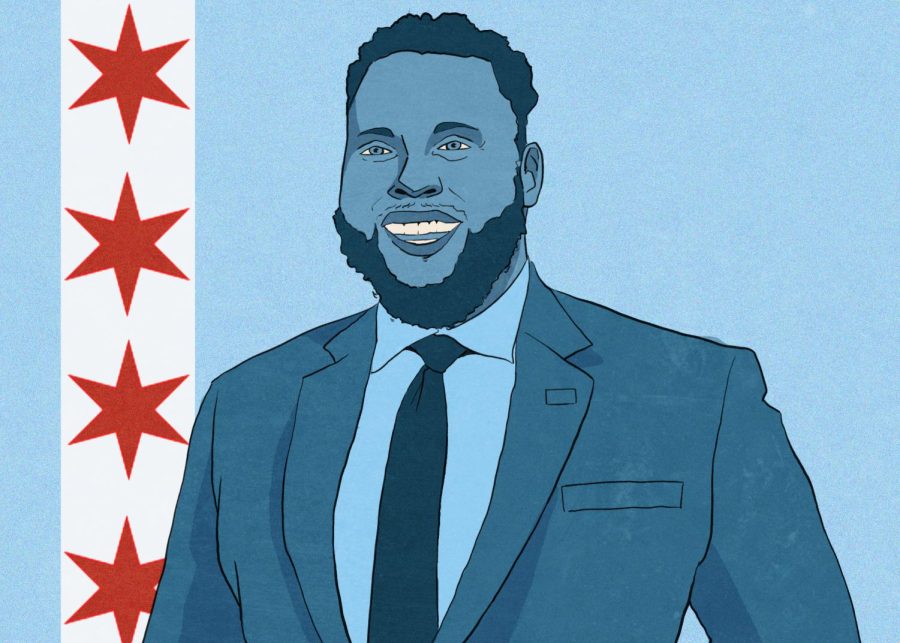
Mayoral candidate and self-described “pro-business progressive” Kambium Elijah “Kam” Buckner has represented Illinois’ 26th district since 2019, and also worked as an aide to Illinois Democratic Sen. Dick Durbin.
Buckner grew up in South Side Chicago and has a law degree from DePaul University College of Law.
Buckner told the Chronicle that the main reason he is running for mayor is to bring a true commitment to prioritizing public safety to City Hall.
Crime and Public Safety
Buckner’s public safety plan is designed to accomplish four key objectives: lower the murder rate, increase the clearance rate, repair the rift between communities and police officers, and restore morale and accountability.
His administration would work to strengthen the existing public safety and justice structures in place, foster collaboration among law enforcement and the communities they serve, increase violence prevention investment, provide support for our first responders and solve more crimes.
Economic Development
Buckner told the Chronicle his administration would work to make Chicago “an economic powerhouse” through an economic opportunity platform. He intends to do so by supporting the business community, giving more opportunities to small businesses in neighborhoods throughout the city and providing support for workers citywide.
Housing
His comprehensive housing platform would reform the Real-Estate Transfer Tax, bolster city-level structures to manage housing, appoint a cabinet-level position that is directly responsible for affordable housing and create new housing options across the city.
“Housing is a human right, and addressing the city’s housing crisis is crucial,” Buckner said.
Transportation
Buckner’s public transportation plan will make key investments in the CTA like electrifying the bus fleet and improving the reliability of trains and buses. He also proposed building non-automobile infrastructure and a completely connected and protected bike grid.
“Ghost buses run rampant, security is lacking and schedules are inconsistent; these issues lead to a myriad of other problems,” he said.
Education
His education plan addresses decades of underfunding and lack of resourcing that Buckner has led to a decline in CPS enrollment.
“It’s a vicious cycle, and students in the district who go to our neighborhood schools, who are primarily Black and Brown and low-income, are the ones who bear the brunt of the impact.”
Chuy García
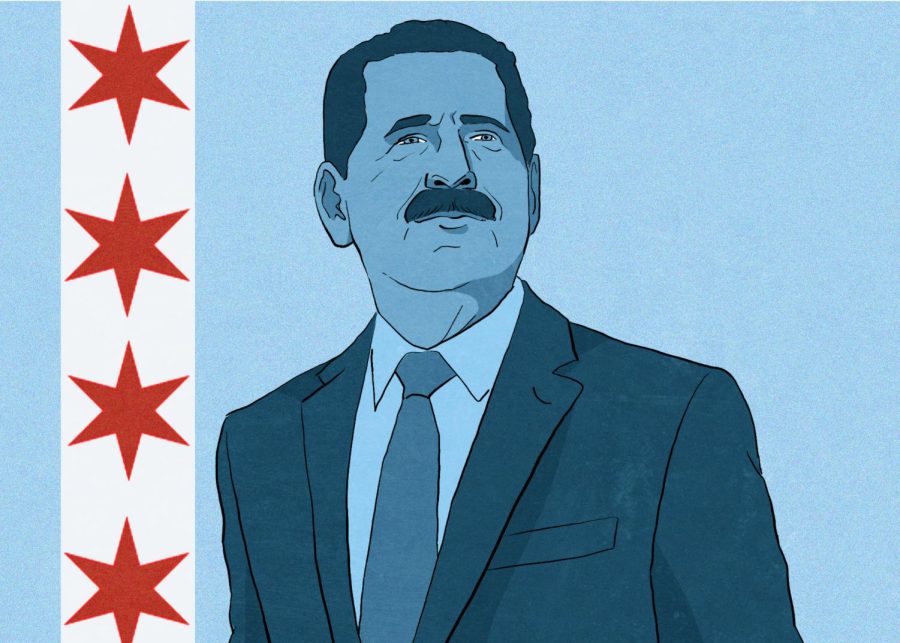
Illinois Rep. Jesús ‘Chuy’ García, who represents Illinois’ 4th congressional district, is running for Chicago mayor again, hoping to make it into an April run-off as he did in 2015 when he faced Mayor Rahm Emmanuel.
García, the first Mexican-American elected to the Illinois State Senate, is campaigning this time to address crime, affordable housing and unemployment.
Crime and Public Safety
Violence prevention is a cornerstone of García’s public safety plan. Prevention investments and community intervention are “critical to the well-being of communities,” he told the Chronicle.
Within the first six months, García said his plan to address crime and public safety is to:
- hire a new superintendent of police
- assemble a community partnership summit of neighborhood community groups familiar with their areas to speed up the implementation of specific public safety strategies and
- address long-standing inequities by fully staffing and modernizing the police department with contemporary database technology and
- convene an additional collaboration with community partners to create a youth jobs program.
Economic Development
To boost economic development, García’s “economic development for all plan” promises to attract funding and jobs to bring regional and international investment to Chicago.
In an interview with the Chronicle, García said he wants to collaborate with educational institutions to “help address the most intractable problems” in the city by “building pipelines to growing sectors of the economy.”
“We’re going to take advantage of the educational institutions that we have, public and private,” García said.
Housing
To address Chicago’s housing crisis, García’s plan expands housing for people who experience gender-based violence, unhoused persons, persons with disabilities and veterans.
García said he plans to establish the “Municipal Restitution Commission” to investigate restitution for victims of redlining and racist covenants.
He is also offering a housing-for-all plan that includes support for raising the Real Estate Transfer Tax, a one-time fee paid when a house is sold, by 1.9 percent on properties over $1 million. The profit from those fees would then be dedicated to combatting homelessness.
Transportation
With his connections in the U.S. Congress and the Illinois state legislature, García said he plans to improve the cleanliness, safety and timeliness of Chicago’s transit systems and hire more staff.
García said removing police from city-wide units and moving more to transportation will help improve safety for riders. He also wants to get rid of the old federal funding formula, where highways get 80% of funding and the other 20% go towards transportation.
Education
To address the decline in enrollment and funding in the Chicago Public Schools, García plans to work at the state and city levels to achieve full financing.
Some of his goals include:
- collaborating with the Chicago Teacher’s Union, school administrators and local stakeholders to determine financial needs and
- working with the Illinois General Assembly to expedite the Evidence-Based Funding timeline to full funding, giving Chicago public schools an additional $350 million.
Ja’Mal Green
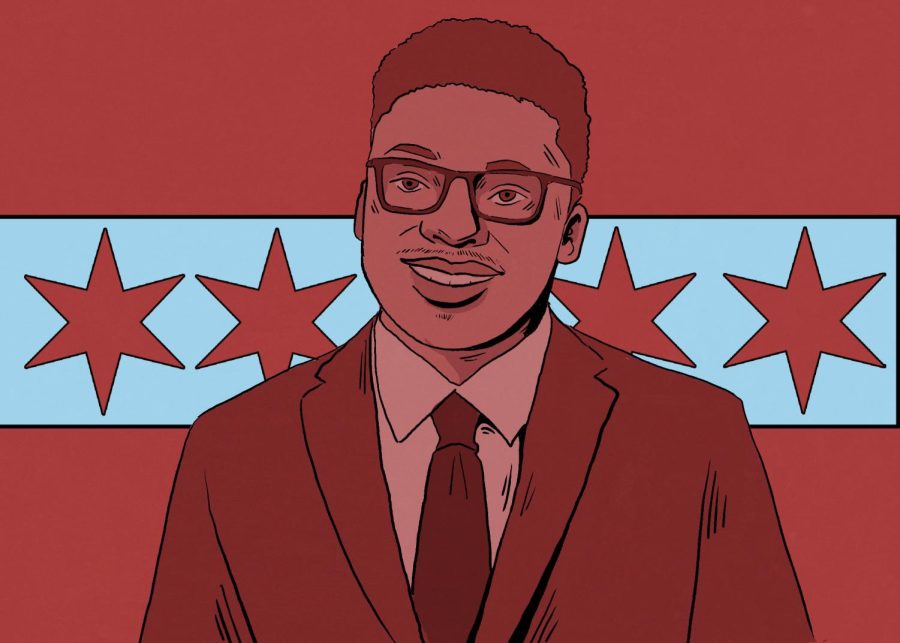
At 27 years old, Ja’Mal Green is the youngest candidate on the mayoral ballot. The self-described “neighborhood advocate,” who grew up on the South and West side, also ran for mayor in 2019. Green has worked as a surrogate on Bernie Sanders’ presidential campaigns.
Green’s activism began in the aftermath of Laquan McDonald’s death at the hand of police officer Jason Van Dyke.
In 2020, Green protested against lending disparities between Chicago’s Black and white neighborhoods at JP Morgan Chase, who eventually pledged a $150 million investment in the South and West sides.
Currently, he is the president of homeownership nonprofit ‘My Turn To Own.’
Green told WTTW that he is “uniquely qualified” to be mayor based on his experience. “I’ve done the work without the fancy title, and that’s the person that needs the job.”
Crime and Public Safety
Green’s three part public safety plan proposes “holistic solutions” of economic investment to prevent crime, emergency response teams and reform to the Chicago Police Department to make policing “more attractive.”
Instead of sending the police, Green plans to hire more social workers and have them respond to calls regarding mental health. Green would also create a city app that would show where crime was happening, similar to the app ‘Citizen,’ using data sourced from CPD.
Green would also increase the number of detectives to improve rates of unsolved crime. To make policing more appealing as a job, Green proposes changing to a 4 day, 12 hour work schedule and reducing cancelled days off.
Economic Development
“We have neighborhoods all across our city that are suffering from the lack of economic investment for so many years,” Green said.
Green has proposed a publicly-owned bank, called “Bank of Chicago,” that would provide loans for developments, housing and small businesses to provide, “an alternative to predatory lenders.”
“This is a city’s bank for the people, by the people and invested back into the people.” Green told the Chicago Sun-Times. We’re taking a risk on creating new homeowners, on creating affordable housing, on opening small businesses. That’s the only way we can start to see a reduction in violence. This is how you create a new property tax base.”
Green’s public safety plan includes a “Prosperity Push Pilot,” which would give $1,000 monthly checks to people living below the poverty line for a year.
Transportation
Green has said that “we need to attack what’s really going on on our public transit system, and that’s gonna be making sure they’re safe, clean and fast.”
Green’s public safety plan includes installing live cameras and creating “Transit Peace Keepers,” armed and unarmed groups that would patrol the CTA.
To address homelessness on public transportation, Green has proposed having social services do case management on the trains.
He would also employ cleaning staff at each station and implement a regular cleaning schedule for the trains.
Green’s plan includes creating a job program for veterans and formerly incarcerated people to address staffing shortages within the CTA.
Education
Green has said that one of the first things he will do in office is “get rid of the waste and the privatization” in Chicago Public Schools and increase union jobs.
Green told the Tribune that he supports a ban on closing public schools with declining enrollment, and he would work with school board and unions.
Brandon Johnson
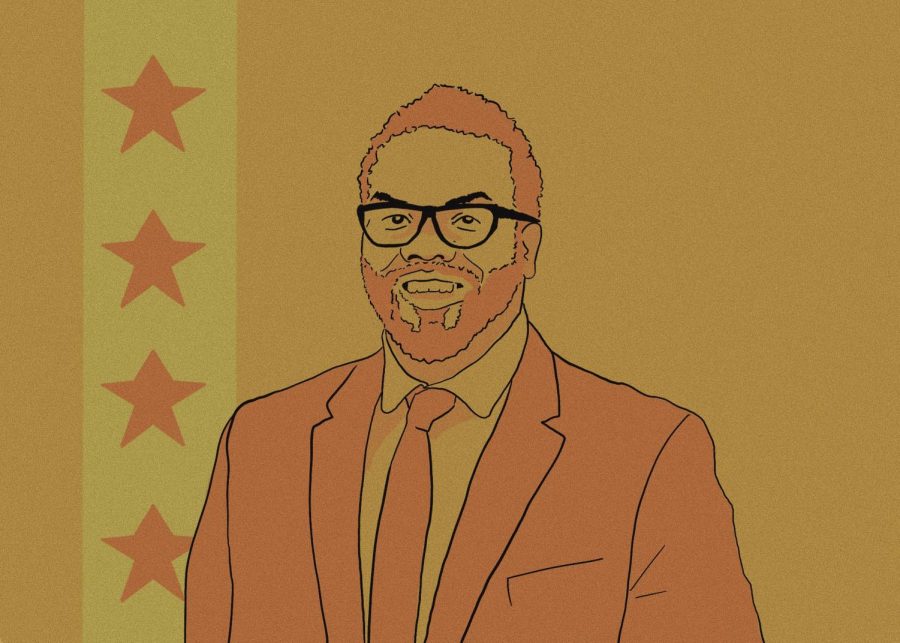
Brandon Johnson has experienced firsthand school closures, unemployment and gun violence in his West Side community.
The former teacher, who later became an organizer with the Chicago Teachers Union, is now running for mayor.
In 2018, Johnson was elected commissioner of the 1st District of Cook County, where he led efforts to pass the Just Housing Ordinance to prohibit housing discrimination against formerly incarcerated people.
He has also been a part of efforts to eliminate the gang database, secure legal representation for immigrants facing deportation and advance recognition of Indigenous People’s Day.
Crime and Public Safety
Johnson said he will work with police and first responders to invest in community-based interventions, in attempts to de-escalate conflict and reduce violence to make Chicago neighborhoods safer.
- create an Office of Community Safety,
- work closely with the Community Commission for Public Safety and Accountability,
- remove gang databases and support Treatment Not Trauma, a program that aims to create a 24-hour crisis response hotline for mental health related emergencies and to reopen Chicago’s mental health clinics and
- invest in the community: schools, jobs, housing and mental health.
Johnson said the Chicago Police Department must comply with the federal consent decree and increase its homicide clearance rate.
Housing
Johnson intends to make housing investments on the South and West sides of the city.
He plans to:
- pass the Real Estate Transfer Tax on multi-million dollar property sales and
- expand the Affordable Requirements Ordinance, which requires residential developments with 10 or more units that receive approval for entitlement, a city land purchase or financial assistance to provide a portion of the units as affordable housing.
He also supports the Bring Home Chicago Ordinance, a grassroots movement committed to creating a dedicated revenue stream to combat homelessness in Chicago.
Economic Development
Johnson wants to ramp up investments in infrastructure, housing, health, mental health and child care by $1 billion per year over the next four years.
- expand child care and pre-kindergarten to create more jobs and provide accessible child care for working parents,
- bring equity to citywide lead line replacement and
- create a public fund to make healthcare an accessible public service, while increasing frontline workers in the Department of Public Health.
Transportation
If elected, Johnson would offer free public transit for certain residents and invest in pedestrian and bicycle infrastructure, especially in Black and Brown communities.
Johnson said that the Chicago Transit Authority must be accountable to residents of the city of Chicago and that his administration “will require CTA leadership to provide accurate and regular reports on service, ridership and system improvements.”
Education
As a former teacher, Johnson said he is passionate about providing every Chicago student a fully resourced, supportive and safe learning environment, regardless of race, income or zip code.
- build Sustainable Community Schools alongside quality affordable housing,
- make sure every school has a library and librarian, adequate clinicians and counselors, as well as art offerings and sports programs and teams,
- provide support around school safety, helping students traumatized by violence, expanding school-based health centers and improving access to technology and
- work to increase school funding.
Sophia King
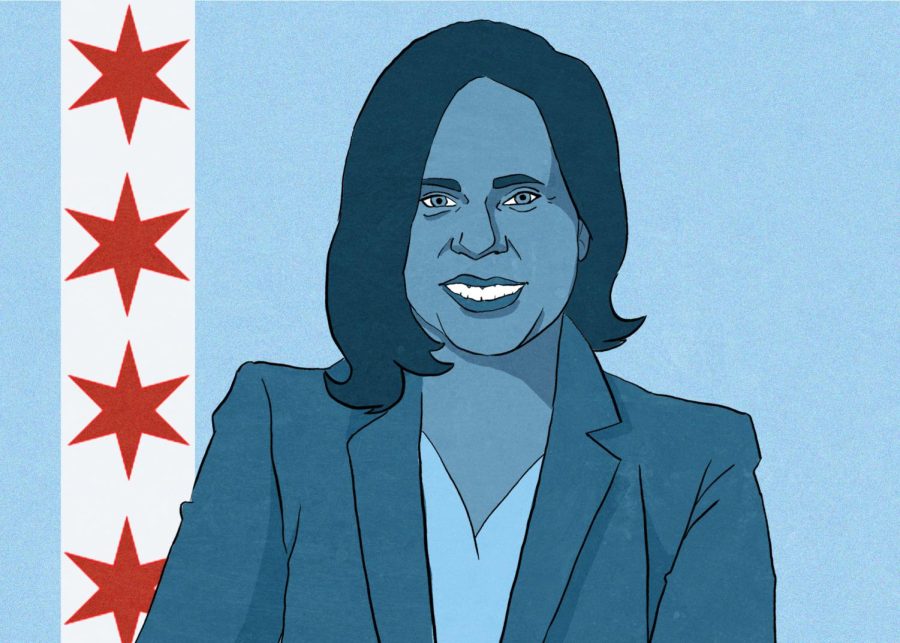
Sophia King has represented the 4th Ward on Chicago’s City Council since 2016. The former educator and small business owner led the effort to raise Chicago’s minimum wage to $15 an hour in 2021.
Her ward includes parts of Columbia College.
King, who is not running again for City Council, has sought to distance herself from that position and instead join in the contentious battle for mayor, offering herself as someone who can deliver stability and a middle-of-the-road approach to issues that divide the city.
Crime and Public Safety
To address, crime the mayoral challenger would create a “Chicago Reserve,” which would consist of 1,000 retired Chicago police officers to handle “crucial” but “non-dangerous” duties throughout the city.
She also would:
- have police officers work 10 hours per day, for four days a week to get more “boots on the ground” throughout Chicago. Officers would be guaranteed “multiple” days off in a row every week and
- embrace technology to combat crime in the city, specifically by using drones as “first responders.”
Economic Development
King said she will work with community businesses and other “stakeholders” on priorities for a “thriving downtown.”
“Chicago can lead the region in job creation and workforce development with a focus on lifting working families and building strong communities,” King told the Chicago Tribune. “I understand that STEM jobs account for two-thirds of the U.S. workforce and the need to sustain STEM workers is vital to our economy.”
Housing
King said affordable housing is the responsibility of the entire city, not just the segregated parts of it.
Her plan includes encouraging and incentivizing mixed-use and mixed-income developments with strong housing components to improve housing affordability and to better align zoning, taxes, subsidies and housing incentives.
Transportation
To increase the safety of alternative forms of transportation besides cars, King would:
- seek lower speed limits in neighborhoods to 20 miles-per-hour,
- implement a no-turn-on-red policy,
- increase safety resources for the elderly and people with disabilities and
- continue crafting an “aggressive” protective bike lane plan.
For public transportation, King would:
- convert the non-sworn security patrols into full-time Transit Police Officers,
- make “significant” investments in cleanliness and
- take a regional approach to public transport to take advantage of larger resources.
Education
King said attracting more students to the Chicago public school system would incentivize growth downtown and throughout the city’s neighborhoods.
“People will not stay in Chicago or come to Chicago if they do not feel safe or have good schools to send their kids,” King said. “We can grow the school population by putting resources into existing schools and increasing the growth of selective enrollment school options, however, with a strong neighborhood component.”
King said she is hopeful that the newly elected school will “engender a greater sense of individual responsibility for CPS,” saying that the school board has acted as an extension of the mayor’s office.
Lori Lightfoot
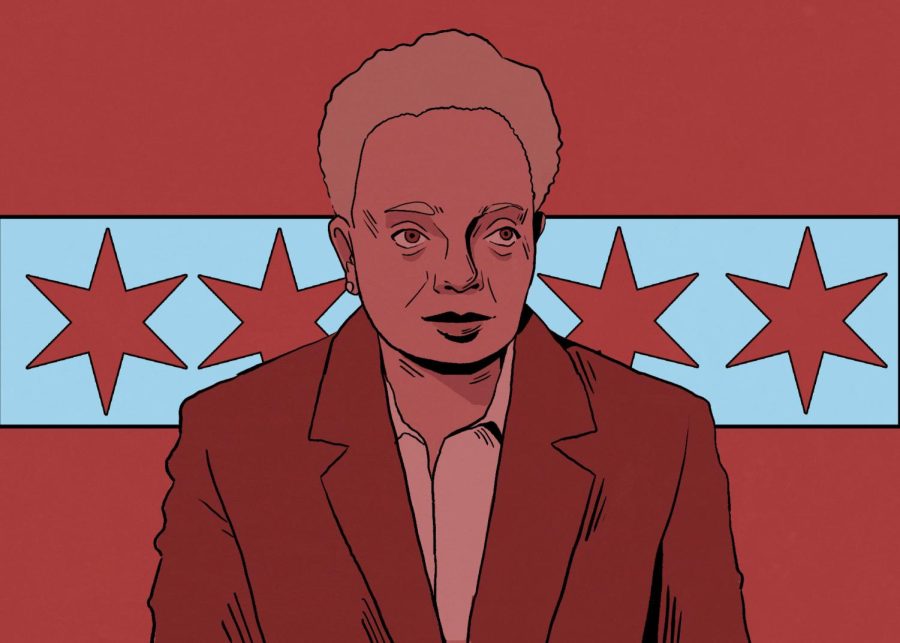
Four years ago, Mayor Lori Lightfoot emerged from the back of a crowded pack to win the top job in Chicago. It was a historic win. Lightfoot is the first Black and openly gay leader of the city.
But she has been an unpopular mayor who has had to grapple with the pandemic, calls for police accountability and a public school system that is losing students. She also has faced criticism over her handling of the George Floyd protests.
She now faces eight candidates in a packed race that may well hinge on whether voters believe she can make the city safe, fix public transportation issues and address public education.
Much of the information for this story was sourced from the Chicago Tribune’s questionnaire, published with Lightfoot’s answers on Jan. 31.
Crime and Public Safety
Lightfoot has ambitious plans to “put more police on the streets and to get guns off them,” according to a Lightfoot for Mayor ad.
Lightfoot also plans to:
- tackle illegal guns, hold dangerous people accountable and invest in communities to address the root causes of violence,
- deploy gun laws at the local level such as the recently passed ban on assault weapons in Illinois,
- focus on giving young people an off-ramp from criminal conduct through social services and other supports.
Economic Development
Lightfoot supports amending city tax subsidies for corporations. Many Chicago businesses were hit hard by the pandemic, and Lightfoot wants to “expand opportunity and drive inclusive economic growth,” through tax subsidy and grant programs like the Chicago Recovery Plan, a federal funding program with a goal to catalyze a sustainable economic recovery from the COVID-19 pandemic.
She also wants to:
- continue the collaboration between city government, community organizations, the business community and philanthropy through programs like INVEST South/West, a community improvement initiative, to marshal resources toward 10 neighborhoods on Chicago’s South and West sides,
- fund “in-full” — otherwise known as the rededication of land to new construction — developments to continue investments in neighborhoods through the Chicago Recovery Plan grants,
- draw visitors back to Chicago’s downtown area by boosting foot traffic through experiences like the Sueños Music Festival, NASCAR, Sundays on State, and Lollapalooza.
Housing
Lightfoot supports accessory dwelling units, which are smaller, independent units located on the same lot as a detached single-family home, to promote naturally affordable units across Chicago.
She wants to accelerate the current pipeline for the Chicago Housing Authority’s affordable housing developments.
Transportation
Lightfoot has faced criticism regarding the city’s public transportation on her watch. CTA ridership is down, and crime is up. Riders also have complained about “ghost” trains and buses that never show up.
She supports:
- funding increases for CTA or other public transit agencies as federal relief funding runs out,
- funding for extending the Red Line to the Far South Side,
- investing in bike and pedestrian infrastructure to reduce traffic congestion and air pollution while promoting physical activity and active transportation.
Education
Lightfoot supports a ban on closing any additional Chicago public schools and a transition to an elected school board. The mayor currently appoints all school board members.
Roderick Sawyer
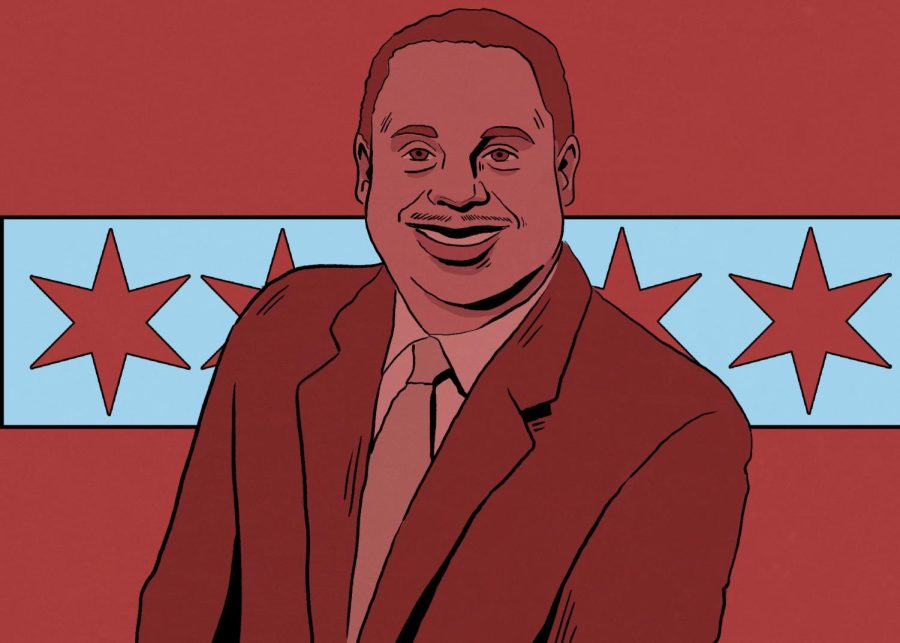
Roderick Sawyer is a longtime Chicago City Council member, elected in 2011 to serve as alderman of the 6th Ward, which encompasses neighborhoods on the city’s far south side.
His father, the late Eugene Sawyer, was selected mayor of Chicago in 1987 following the death of the city’s first Black mayor, Harold Washington. Eugene Sawyer served until 1989. He lost his election bid to Richard M. Daley.
A lawyer, Roderick Sawyer is the leader of the Chicago City Council Black Caucus.
Crime and Public Safety
On Jan. 11, Sawyer released his public safety plan, which he claims will immediately reduce crime and improve safety in all Chicago neighborhoods.
Sawyer told The Chicago Circular his plan is to add more police officers and resources while reforming the department to be more equitable.
He is working to bring in new officers by offering fully vested pension plans after 20 years of service but emphasizes that officers can stay on duty past 20 years.
Economic Development
During an ABC-7 debate on Jan. 19, Sawyer spoke about the recent closures of businesses downtown due to the pandemic. He said resident’s anxieties about crime and safety are causing them to go out less.
In addition, Sawyer said he wants to create a low-cost or no-cost loan program to help purchase and redevelop vacant lots around Chicago.
Housing
Sawyer said one of the biggest problems is the density bonuses given to developers downtown, not because of money, but because they are being forced to build properties close to each other.
For example, Sawyer said, developers are trying to build affordable housing in the Fulton Market area, but there are many empty lots that can be used in Englewood, East Garfield Park and Lawndale.
Transportation
At a Jan. 28 mayoral forum at the University of Illinois Chicago, Sawyer said he would advocate for coordination between the CTA Chicago Transit Authority and the Chicago Department of Transportation to create more bus lanes.
He also would address:
- homeless people who use trains as shelters by training CTA employees to connect people with housing and social services.
- advocate for Slow Streets, which demands pedestrian zones around Chicago.
Education
Sawyer said he supports closing under-enrolled Chicago schools. “Our most severely under-enrolled schools simply can’t carry on at these zombie institutions,” Sawyer told WBEZ. “What kind of experience are these children getting if their school doesn’t have a single sports program, a debate club, a theater club or any of the traditional extracurriculars that help kids develop lifelong passions and social skills?”
Paul Vallas
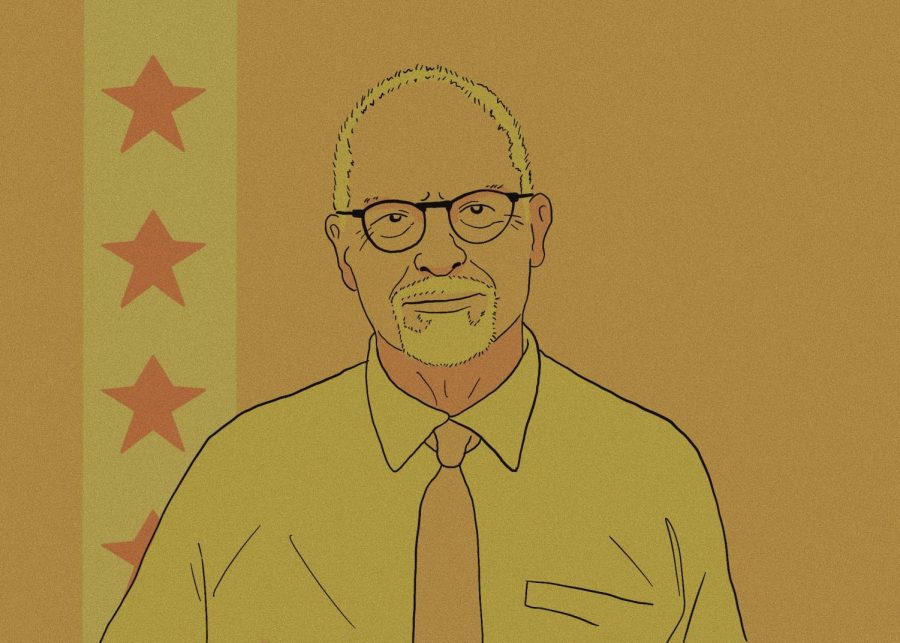
Former Chief Executive of Chicago Public Schools Paul Vallas has served as the city’s budget director and for different jobs in other parts of the country.
In 2013 Vallas returned to Illinois to run for lieutenant governor with Gov. Patrick Quinn, who lost to Republican Gov. Bruce Rauner.
Vallas ran for mayor in 2019 and lost to now-Mayor Lori Lightfoot.
Vallas has been under intense scrutiny in the weeks leading up to the election, with allegations about his residency that later turned out to be false.
More recently, Vallas had to distance himself from Florida Gov. Ron DeSantis who was in Chicago to speak at an event promoted by the Fraternal Order of Police. The FOP has endorsed Vallas for mayor.
Vallas said that he does not support DeSantis’ far-right extremist views like LGBTQ+ community erasure or banning Black history books.
Crime and Public Safety
Vallas plans to fire Police Superintendent David Brown and his leadership team and appoint a new leader from within Chicago Police Department.
He also proposes to:
- return to the community policing model, assigning officers to specific neighborhood beats again and
- implement a citywide Witness Protection Program funded using fines and seized assets.
Economic Development
Vallas said he intends to create an Independent Community Development Authority led by community leaders in order to revive neighborhoods without displacement.
In addition, he plans to direct contracting by city agencies to local businesses.
Housing
Vallas intends to allow property owners to transform unused spaces into garden apartments. He will also regulate property taxes so the tenants are not experiencing rent raises.
Transportation
Vallas does not have a separate plan for Chicago Transit Authority and has acknowledged that it is not his strongest topic; however, wants to divert $101 million dollars in CTA funding for private, unarmed security guards to be present on platforms and trains.
Education
To support students beyond the classroom, Vallas proposes extending school hours to evenings and weekends.
He also would:
- introduce a work-study program in schools to prevent students from joining gangs
- open alternative “adult high schools” for students who left during COVID-19.
Willie Wilson
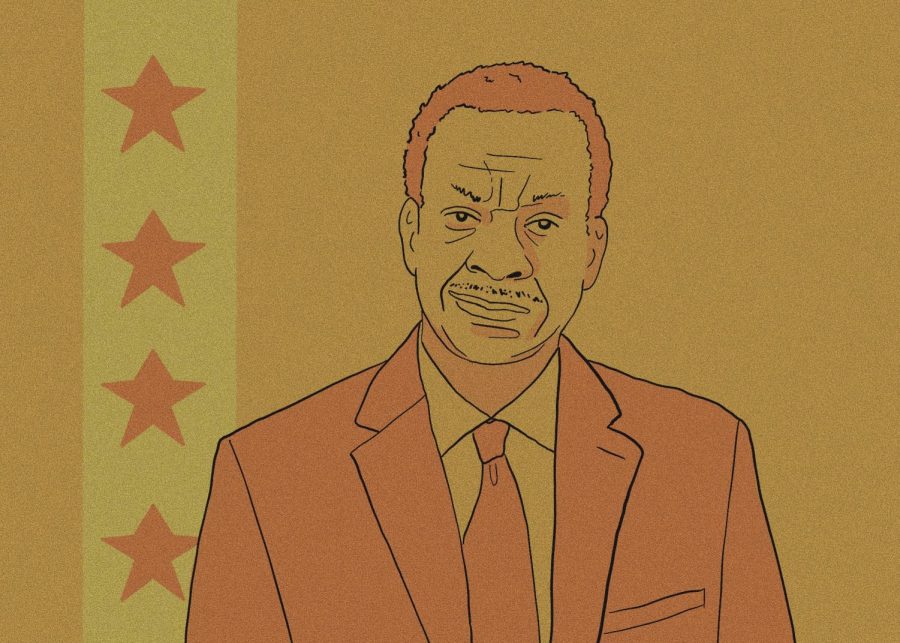
Millionaire businessman and mayoral candidate Willie Wilson is a two-time candidate for mayor, running in 2015 and again in 2019. He was also a Democratic presidential candidate in 2016.
Wilson, who owns a medical supply company, is known for his gas and food giveaways.
He came under fire during a heated debate in January when he criticized incumbent Lightfoot for her handling of crime in the city. He said police should be able to chase down suspects and “hunt them down like a rabbit.”
Wilson launched a voter registration drive to get more Chicago residents to vote and asked a federal judge in August to block a precinct consolidation plan tied to redistricting that ultimately eliminated 779 of Chicago’s 2,069 precincts.
Crime and Public Safety
Crime is the issue most on Chicago voters’ minds, Wilson told the Chicago Sun-Times.
“My idea of solving crime would be to hold the superintendent of police accountable,” he said in that interview.
To simplify policing and hold residents accountable, part of Wilson’s safety plan is to:
- divide the city into four police districts and
- have four superintendents of police.
Wilson would integrate a diverse police force designated to patrol each neighborhood.
Wilson also supports bail for non-violent low level offenders during holidays.
Economic development
To address issues magnified by the pandemic, Wilson proposes working together with appropriate agencies.
Wilson cites his business experience as a reason to vote for him because business is the foundation for Chicago communities.
Housing
Wilson advocates for the financial support of at-risk homeless persons.
His plan to address affordable housing challenges is to cut taxes to keep residents from leaving Chicago.
Transportation
Wilson’s plan to increase the reliability of Chicago’s transportation system involves placing more armed security on buses and trains by hiring more police officers, he said in the Jan. 19 mayor debate.
At the same debate, Wilson cited Lightfoot’s failure to keep people safe when using public transportation.
He has said he would lower fares to increase ridership on the Chicago Transit Authority.
Education
Wilson told the Chicago Crusader that he wants to restore trade curriculums in high schools, churches and prisons. He plans to establish a trade school near CTA bus terminals to facilitate easy access for students.
